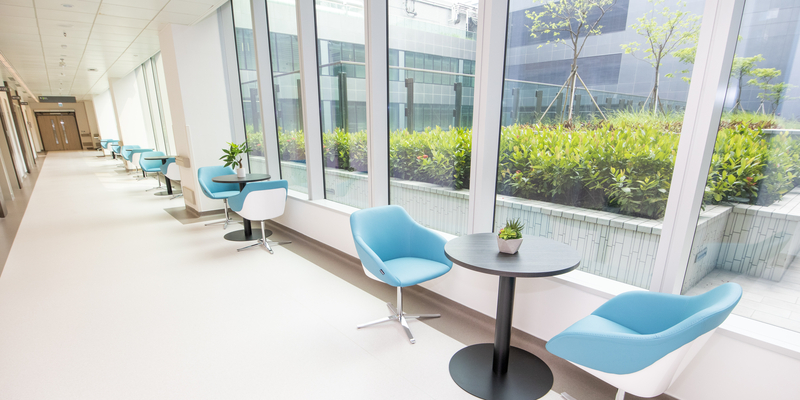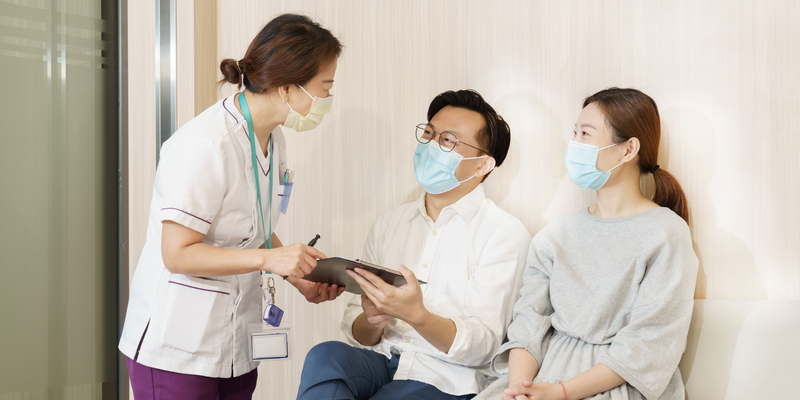Prestige Health Check Programme
Overview

The programme covers more than 60 checkup items, checking for symptoms and risk for cardiovascular diseases, diabetes, cancer and other common health conditions. Prior to the health check, our family physician will analyse your medical history, health conditions and risk factors, and decide together if additional items under our “Health+” component should be considered based on your situation.
The health check is conducted at the exquisitely situated and aesthetically pleasing CUHK Medical Centre, which offers great convenience. Together with our state-of-the-art equipment and professional medical team, we look forward to delivering the best-in-class care service to you and your family.
Programme Features:
- Professional team for holistic care
- Latest technology for reliable assessment
- Comfortable environment with attentive care
- Patient-centric with service flexibility
Programme Details

Prestige Health Check Programme | |||||
Health Check Items | Male | Female | Objectives | ||
| Medical History | ✔ | ✔ |
| ||
| Physical Examination | Blood Pressure | ✔ | ✔ |
| |
| Height | ✔ | ✔ | |||
| Body Weight | ✔ | ✔ | |||
| Body Mass Index (BMI) | ✔ | ✔ | |||
| Waistline | ✔ | ✔ | |||
| Blood Analysis | Blood Grouping and Rh Factor | ✔ | ✔ |
| |
| Complete Blood Count | ✔ | ✔ | |||
| Erythrocytes (Red Blood Cell) | ✔ | ✔ | |||
| Hemoglobin | ✔ | ✔ | |||
| White Blood Cell | ✔ | ✔ | |||
| Platelet | ✔ | ✔ | |||
| Coronary Artery Disease | Lipid Profile | ✔ | ✔ |
| |
| Total Cholesterol | ✔ | ✔ | |||
| High-density Lipoprotein & Low-density Lipoprotein Cholesterol | ✔ | ✔ | |||
| Non-high-density Lipoprotein Cholesterol | ✔ | ✔ | |||
| Triglycerides | ✔ | ✔ | |||
| Total Cholesterol / HDL Ratio | ✔ | ✔ | |||
| Diabetes Assessment | Fasting Blood Glucose | ✔ | ✔ |
| |
| Glycated Hemoglobin (HbA1c) | ✔ | ✔ | |||
| Liver Function Test | Total Protein, Albumin, Globulin | ✔ | ✔ |
| |
| ALT | ✔ | ✔ | |||
| Gamma GT(γ-GT) | ✔ | ✔ | |||
| Alkaline Phosphatase | ✔ | ✔ | |||
| AST | ✔ | ✔ | |||
| Total Bilirubin | ✔ | ✔ | |||
| Bone Function Test | Calcium, Phosphorus | ✔ | ✔ |
| |
| Vitamin D | ✔ | ✔ | |||
| Renal Function Test | Urea | ✔ | ✔ |
| |
| Creatinine | ✔ | ✔ | |||
| Sodium | ✔ | ✔ | |||
| Potassium | ✔ | ✔ | |||
| eGFR | ✔ | ✔ | |||
| Chlorides | ✔ | ✔ | |||
| Gout Screening | Uric Acid | ✔ | ✔ |
| |
| Thyroid Function Test | Thyroid-stimulating Hormone (TSH) | ✔ | ✔ |
| |
| Free T4 (FT4) | ✔ | ✔ | |||
| Stool Routine | Stool Routine | ✔ | ✔ |
| |
| Urinalysis | Urine Routine | ✔ | ✔ |
| |
| Heart Assessment | Exercise Treadmill Stress Test | ✔ | ✔ |
| |
| Lung Assessment | Lung CT Scan | ✔ | ✔ |
| |
| Breast Assessment | Breast Ultrasound Scan | ✔ |
| ||
| 3D X-Ray Breast Imaging* *Convert to 2D Mammogram (reduced by HK$1,050) | ✔ |
| |||
| Ultrasound Whole Abdomen | Ultrasound Upper Abdomen (Liver, Gallbladder, Pancreas, Spleen and Kidneys) | ✔ | ✔ |
| |
| Prostate Ultrasound (for male) | ✔ |
| |||
| Ultrasound Pelvis (for female) | ✔ |
| |||
| Infectious Disease Screening | Male | Female | Objectives | ||
| Hepatitis A and Hepatitis B Screening | Hepatitis A Antibody | ✔ | ✔ |
| |
| Hepatitis B Antigen | ✔ | ✔ |
| ||
| Hepatitis B Antibody | ✔ | ✔ |
| ||
| Hepatitis C Antibody | ✔ | ✔ |
| ||
| Helicobacter pylori Screening | Urea Breath Test (UBT) | ✔ | ✔ |
| |
| Serology | Anti-Rubella Virus IgG (Female) | ✔ |
| ||
| Treponema Pallidum Antibody for Syphilis | ✔ | ✔ |
| ||
| Cancer Assessment | Male | Female | Objectives | ||
| Colorectal Cancer Risk Assessment | Fecal Occult Blood Test (FOBT) | ✔ | ✔ |
| |
| Cervical Cancer Screening (Female) | Pap Smear and HPV DNA Screening | ✔ |
| ||
| Tumour Markers | Alpha Fetoprotein (AFP) | ✔ | ✔ |
| |
| Prostate-Specific Antigen (PSA) (Male) | ✔ |
| |||
Discounted Fee (HKD) |
|
| |||
| Original Fee (HKD) | $18,825 | $23,590 | |||
“Health+” Items | ||||
| Check Up Items | Objectives | |||
| Bone Mass Assessment Test | Dual-energy X-ray absorptiometry (DEXA) for spinal cord and hip joints |
| ||
| Cancer Screening | CA125 |
| ||
| Carcinofetal Antigens |
| |||
| DNA Screening for Nasopharyngeal Cancer |
| |||
| EBV DNA Screening for Nasopharyngeal Carcinoma |
| |||
| Heart Assessment | CT-Coronary Angiogram (CTCA) with Calcium Scoring |
| ||
| CT-Coronary Angiogram (CTCA) without Calcium Scoring |
| |||
| Echocardiogram |
| |||
| 24-hour ECG (Holter) Monitoring |
| |||
| Upgrading Exercise Treadmill Stress Test to CT-Coronary Angiogram (CTCA) with Calcium Scoring |
| |||
| Upgrading Exercise Treadmill Stress Test to CT-Coronary Angiogram (CTCA) without Calcium Scoring |
| |||
| Hepatocellular Carcinoma Screening | Alpha-fetal Protein (AFP) |
| ||
| Abnormal Prothrombin (APT) | ||||
| Sexually-transmitted Disease | HIV Combination Test |
| ||
| IgG Herpes Simplex Virus Type 1 IgG |
| |||
| IgG Herpes Simplex Virus Type 2 IgG | ||||
| Sleep Test | Polysomnography |
| ||
 Booking and enquiry: 3946 6188
Booking and enquiry: 3946 6188
 11/F, Wellness Centre, CUHKMC
11/F, Wellness Centre, CUHKMC
CONSULTATION HOURS MON - FRI 9:00AM - 5:00PM SAT: 9:00AM - 1:00PM SUN AND PUBLIC HOLIDAYS CLOSED |
|---|
Important Notes

- Please dress comfortably on check-up day and avoid necklace or other metallic accessories.
- Avoid staying up late, drinking or strenuous exercising the day before your check-up.
- Please notify your doctor of any on-going use of medication such as hypertension, diabetes, and/or cardiovascular diseases.
- Please notify your doctor if you are pregnant or expecting to be pregnant as items such as X-ray and cervical screening are to be avoided.
- In case fasting blood test is necessary for blood lipid or glucose level monitoring, patients should avoid eating or drinking for at least 8 hours prior.
- Please notify the medical team prior to any blood draw if you have blood or needle phobia.
- Please follow instructions from the medical team during your check-up. If you experience any discomfort, notify the team immediately.
Many health issues, such as hypertension, diabetes, or even cancer do not display obvious symptoms in their early stages. If you only undergo health check when unwell arises, it is possible that the condition has progressed to a later stage, potentially losing the golden window and making treatment difficult. The exact purpose of health check is to undercover illnesses or conditions in their early stages, where treatment or other preventive measures are the most effective – it is for this reason that you are recommended to undergo regular check-ups.
Women of different ages have different health needs – younger women tend to have anaemia due to irregular living habits; as one ages, endocrinological problems, such as central obesity, hypertension, diabetes, high triglycerides levels, are more prevalent. Hence, women of all ages should undergo health check-ups regularly. Our medical team will recommend the relevant items based on your health condition, as well as medical history of yourself and your family.
Men of different ages have different health needs – younger men tend to have irregular living habits such as lack of rest, imbalanced diet, lack of exercise, drinking or smoking, which could lead to health issues; as one ages, endocrinological problems, such as central obesity, hypertension, diabetes, high triglycerides levels, are more prevalent. Hence, men of all ages should undergo health check-ups regularly. Our medical team will recommend the relevant items based on your health condition, as well as medical history of yourself and your family.
Menstruation might affect the checking of urine, stool occult blood and other gynaecological tests, and hence we recommend against conducting check-ups while you are having your period. If your check-up date coincides with your menstrual cycle, please contact us to reschedule your check-up to at least 5 days after your cycle.
For female that are pregnant or expecting to be pregnant, tests such as X-ray imaging, cervical screening and other intrusive check-up procedures might affect the foetus and should be avoided. Consult your doctor if you are in such situations.
It is crucial that our doctor understands your body and health condition, dietary practice, personal and family medical history and other risk factors before your check-up to design a personalised check-up programme fit to your needs.
For post-check consultation, since health check reports can include a large amount of information and metrics, a thorough debrief and analysis from our doctor will help you have an accurate understanding of the implications and your health condition, avoiding any misunderstanding and anxiety. Moreover, our doctor can recommend any follow-up actions if necessary, so you can respond to the situation as soon as possible.
If you carry certain risk factors, such as the habit of smoking or drinking, aging, or as indicated in your family medical history, you might benefit from a more frequent testing. Your doctor will be able to suggest a testing schedule after thoroughly evaluating your conditions.
Depending on the check-up items, most procedures are completed within a half day, with the report made available within 3 to 4 weeks' time.
You may request male or female doctors for check-up procedures. Please indicate your preference at the time of making your appointment.











